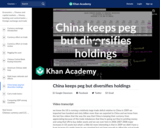
China keeps peg but diversifies holdings. Created by Sal Khan.
- Subject:
- Economics
- Social Science
- Material Type:
- Lesson
- Provider:
- Khan Academy
- Provider Set:
- Khan Academy
- Author:
- Sal Khan
- Date Added:
- 07/27/2021

China keeps peg but diversifies holdings. Created by Sal Khan.

China Pegs to Dollar to Keep Trade Imbalance. Created by Sal Khan.

Chinese Central Bank Buying Treasuries. Created by Sal Khan.
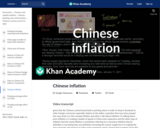
Chinese inflation. Created by Sal Khan.
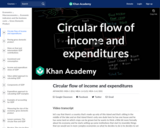
In a closed economy, goods and services are exchanged in product markets and factors of production are exchanged in factor markets. In this video, we explore how to model this in a straightforward way using the circular flow model. Created by Sal Khan.
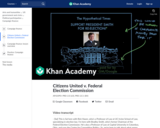
A deep dive into Citizens United v. FEC, a 2010 Supreme Court case that ruled that political spending by corporations, associations, and labor unions is a form of protected speech under the First Amendment. In this video, Sal discusses the case with scholars Richard Hasen and Bradley Smith.

Students will learn what it means to be a U.S. citizen and how citizenship is obtained. They will compare and contrast personal and political rights with social responsibilities and personal duties. Students will explore global citizenship, and the rights and responsibilities of citizens in other countries. They will also learn about community engagement by selecting a problem of their own and creating a plan to solve it.

In this lesson students will examine the concept of "citizen" from a definitional perspective of what a citizen is and from the perspective of how citizenship is conferred in the United States. Students will discuss the rights and responsibilities of citizens and non-citizens and review the changing history of citizenship from colonial times to the present.
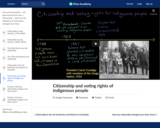
How has the citizenship status and voting rights of indigenous people changed over time in the United States? Created by Kimberly Kutz.
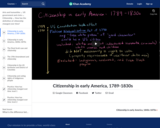
An overview of Citizenship in early America: 1789-1830s. Created by Kimberly Kutz.
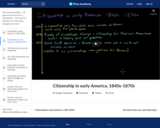
An overview of Citizenship in early America, 1840s-1870s. Created by Kimberly Kutz.
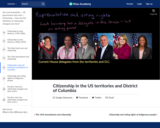
What is the citizenship status of people who live in the US territories and District of Columbia? Created by Kimberly Kutz.

For many students, a trip to Washington, D.C. is a once-in-a-lifetime experience that opens their eyes to an exciting world beyond their classrooms. Discovery Education and First Lady Dr. Jill Biden welcome students to a behind-the-scenes Virtual Field Trip to experience the history and beauty of our nation’s capital.
Designed for students in grades 4-8, this action-packed tour features remarkable special guests and give viewers an inside look at six landmark locations:
The White House
The U.S. Capitol Building
The Supreme Court
The Martin Luther King, Jr. Memorial
Arlington National Cemetery and the Tomb of the Unknown Soldier
The Smithsonian National Air and Space Museum

The purpose of this lesson is to engage students in a discussion of the Constitutional Convention.Students will explore the key disputes that arose during the convention, including most prominently how power would be divided between the federal and state governments and the various branches of government. Furthermore, students with understand the importance of compromise during the Constitutional Convention. They will then apply these observations to other historical examples of debate and compromise to understand the nature of decision-making and civic discourse--discussion rooted in mutual respect for differences and desires for understanding--in the United States.
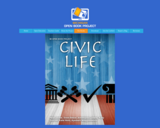
Using an inquiry based approach, Michigan high school students will learn about the foundations of American government by studying the Constitution and exploring how it works today.

The United States Founders believed that certain civic virtues were required of citizens in order for the Constitution to work. Numerous primary sources—notably the Federalist Papers and the Autobiography of Ben Franklin—point us to the "Foundersâ" Virtues." Before exploring the Documents of Freedom, it is important to understand civic virtue as an essential element of self-government.
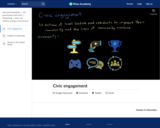
Definition and examples of civic engagement. Created by Kimberly Kutz.
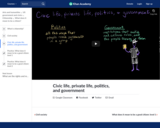
An overview of Civic life, private life, politics, and government. Created by Kimberly Kutz.

Engaging, teacher-created lesson plans on the Constitutional Convention, Freedom of Speech, 4th Amendment, Electoral College, Federalist and Federalism, more.

Explores the rights guaranteed to Americans as well as the attendant responsibilities that come with those rights...The Walter and Leonore Annenberg Presidential Learning Center at the Ronald Reagan Presidential Foundation utilizes a project based approach to civic education while advocating for the comprehensive exploration of primary sources to meet this objective.